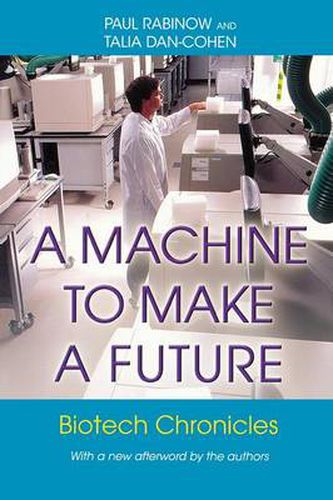Readings Newsletter
Become a Readings Member to make your shopping experience even easier.
Sign in or sign up for free!
You’re not far away from qualifying for FREE standard shipping within Australia
You’ve qualified for FREE standard shipping within Australia
The cart is loading…






A Machine to Make a Future represents a remarkably original look at the present and possible future of biotechnology research in the wake of the mapping of the human genome. The central tenet of Celera Diagnostics - the California biotech company whose formative work during 2003 is the focus of the book - is that the emergent knowledge about the genome, with its profound implications for human health, can now be turned into a powerful diagnostic apparatus - one that will yield breakthrough diagnostic and therapeutic products (and, potentially, profit).Celera’s efforts - assuming they succeed - may fundamentally reshape the fabric of how health and health care are understood, practiced, and managed. Presenting a series of interviews with all of the key players in Celera Diagnostics, Paul Rabinow and Talia Dan-Cohen open a fascinating window on the complexity of corporate scientific innovation. This marks a radical departure from other books on the biotech industry by chronicling the vicissitudes of a project during a finite time period, in the words of the actors themselves.Ultimately, the authors conclude, Celera Diagnostics is engaged in a future characterized not by geniuses and their celebrated discoveries but by a largely anonymous and widely distributed profusion of data and results - a machine to make a future.
In their new afterword, Rabinow and Dan-Cohen revisit Celera Diagnostics as its mighty machine grinds along, wondering, along with the scientists, what constitutes success and what constitutes failure? The pathos of the situation turns on how one poses the question as much as how one answers it.
$9.00 standard shipping within Australia
FREE standard shipping within Australia for orders over $100.00
Express & International shipping calculated at checkout
A Machine to Make a Future represents a remarkably original look at the present and possible future of biotechnology research in the wake of the mapping of the human genome. The central tenet of Celera Diagnostics - the California biotech company whose formative work during 2003 is the focus of the book - is that the emergent knowledge about the genome, with its profound implications for human health, can now be turned into a powerful diagnostic apparatus - one that will yield breakthrough diagnostic and therapeutic products (and, potentially, profit).Celera’s efforts - assuming they succeed - may fundamentally reshape the fabric of how health and health care are understood, practiced, and managed. Presenting a series of interviews with all of the key players in Celera Diagnostics, Paul Rabinow and Talia Dan-Cohen open a fascinating window on the complexity of corporate scientific innovation. This marks a radical departure from other books on the biotech industry by chronicling the vicissitudes of a project during a finite time period, in the words of the actors themselves.Ultimately, the authors conclude, Celera Diagnostics is engaged in a future characterized not by geniuses and their celebrated discoveries but by a largely anonymous and widely distributed profusion of data and results - a machine to make a future.
In their new afterword, Rabinow and Dan-Cohen revisit Celera Diagnostics as its mighty machine grinds along, wondering, along with the scientists, what constitutes success and what constitutes failure? The pathos of the situation turns on how one poses the question as much as how one answers it.